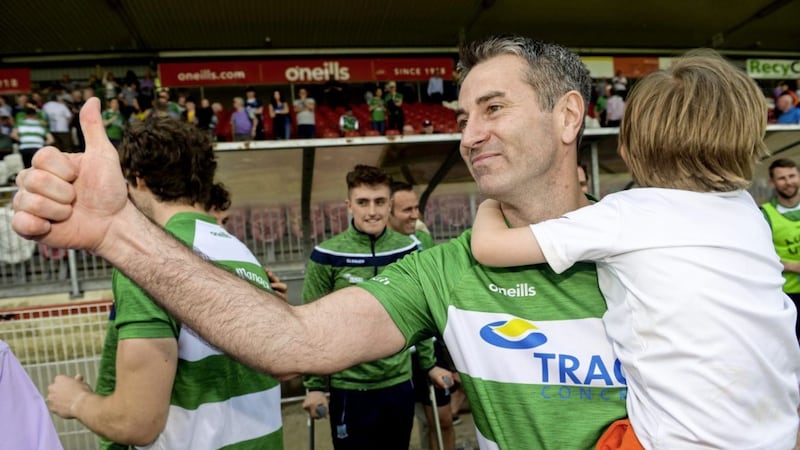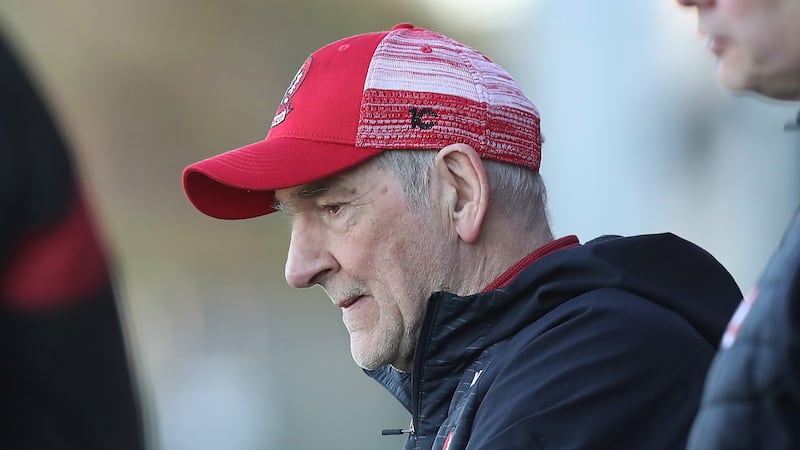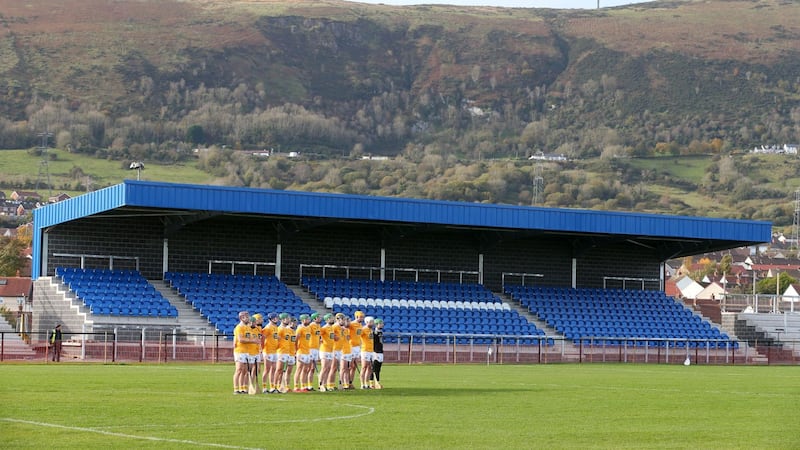FATE would have to have its own quirky way with Rory Gallagher.
Another half a mile out the road in the border village of Belleek and he’d have been born a Donegal man. Maybe would have helped them win what they might have won in the early 2000s.
Instead, it was in the green and white of Fermanagh that he played most of his football, even though his existence was almost nomadic at times.
There was that solitary season in the blue of Cavan, while his club career that began with Erne Gaels famously took him to an All-Ireland club title with St Gall’s, and Dublin and Leinster titles with St Brigid’s.
And yet if the word synonymous applies to anything in his footballing days, it would either be the 3-9 he hit against Monaghan as a player, or the six successful years he spent coaching and then managing Donegal.
Naturally, the sparkling early romance, the first rough break-up, the fresh start and the uncomfortable way things ended in his adopted county have been outmuscling any of the other narratives that exist around Sunday’s provincial decider.
He reckons he trained the senior members of the Tír Chonaill squad as many as 800 times. They were friends.
Gallagher would spend hours on the phone to McGuinness, pulling this way and that over tactics and systems and players and ideas. But eventually one diamond scratched the other and Rory had to go.
When he came back at the helm in 2015, he knew it was an ageing squad. They almost got the better of Tyrone in the Ulster final in 2016, and that was his best chance of solo silverware.
If Donegal win Ulster on Sunday, they’ll owe him a lot. And if Fermanagh win it, they’ll owe him everything.
In no way does that create a sense that he can’t lose, but Donegal is part of Rory Gallagher’s being, and the bond they had is part of the being of those players.
And yet, there’s a single-mindedness that had to exist if he was to move on. And that’s one thing he’s certainly always had, as he admits himself.
“Football’s funny. I stopped playing for Fermanagh in 2010 and got involved with Donegal, and I didn’t give Fermanagh a second thought.
“My friends would tell me I’m very selfish when I’m involved in football, I don’t bother about them. They know that.
“There might be a six-week period in the year where I’d say ‘do you want to do this?’ That’s the way I am now. I’m totally bogged down in Fermanagh.
”It is unique coming up against Donegal. They know the way I’ll prepare and I know the way they’ll prepare, in the sense that it’s all about winning.”
The wheels may have been broken off the wagon by Galway but it was only free-wheeling by then anyway. The manner of Tyrone’s emphatic Ulster semi-final victory over them wrecked the chassis of three years’ work. There was no recovering from that.

When the announcement that he was quitting with a year left to run was made, in one way it felt like a shuddering halt, yet in another a natural denouement.
Gallagher’s retained his counsel over it all, from the fallout with McGuinness through his own curtain falling. Was he sore about how it all ended though?
“Ah, no. Sore to lose to Galway, sore to lose to Tyrone? Absolutely.
“Did I know starting out that year it was going to be a tough year? Absolutely.
“You’d seven years involved with them, five Ulster finals and one under-21, a lot of great days. You’ll have some tough days.
“Jesus, when the game’s over against Galway with 20 minutes to go, it’s very difficult. We hadn’t been used to that. I said to the boys they’d be stronger for it and learn from it. That’s part of the emergence.
“Dublin wouldn’t be what they are today without some tough days against Kerry and Meath. I wouldn’t doubt the strength of those Donegal players to come back over a period of time.”
And yet here he is now, representing the green and white end of Pettigo, where the celebratory Donegal busses would pass out of Fermanagh and cross into their home county for the first time on their victory laps.
No matter how strong the bond to some of his former charges, there won’t be a part of him this weekend that doesn’t want to make Pettigo the end of the party rather than the start.
*****
“People would be constantly talking about Fermanagh having an inferiority complex. I certainly didn’t have that. People and players would get sentimental about the idea of just reaching an Ulster final or playing in Croke Park. I never got caught up into that idea. I thought it would be great to win an Ulster final and win in Croke Park.”
Rory Gallagher in June 2011
DESPITE coming from one of only two counties never to have won their provincial title, the idea of a moral victory has never interested him.
The Fermanagh players were criticised for going on a lap of the Croke Park pitch after their 2015 All-Ireland quarter-final defeat by Dublin, which none other than Jim McGuinness said was indicative of a ‘culture of mediocrity’.
That had been a promising start under Pete McGrath but there was an absolute lack of conviction about everything they did in 2017 that could not stand in greater contrast to their championship performances this summer.
The players felt there was more in the tank and, as their sleeper fitness coach Nicholas Walsh outlined in The Irish News earlier this week, they’re determined to empty that tank in the short-term.
“We looked at the whole thing and said these players weren’t interested in a three or four-year plan. It’s a five, six, seven month plan to get better.
”We have what we have. We’ve maxed on one gym session a week because we said strength wasn’t the reason Fermanagh are losing.
“Skill level and decision-making was a huge part of it. To play at the intensity you want to play at, you have to be really conditioned, and tactically we have to be smarter to give ourselves a better chance of results.
“It’s very skill orientated and decision orientated. We felt we were giving the ball away far too much in big games. We felt we weren’t competitive enough.
“We wanted to win more primary possession and yes, we wanted to stop leaking big scores, which we did in the league. That’s led to this perception that all we do is get involved in tactics, which we don’t.
“Yes, we had to get tactically better we felt to be able to compete with the Tyrones and Monaghans and Donegals, who are so far down the road from their management teams and the quality of players.
“These boys haven’t played in those big games. Now they’ve played in two big Championship games that they’ve won. They’ve come through the league and they’re starting to get familiar with it and enjoy it.”
When he coached in the national schools around Blanchardstown and Castleknock while living in Dublin a decade ago, Rory Gallagher lived just up the road from the Brogans.
He would drive past Dunboyne FC’s pitch in Laurel Lodge regularly, and out there on it would be the young Bernard with an O’Neill’s ball.
The likes of Paddy Andrews, Philip McMahon, Jonny Cooper and Ciaran Kilkenny also crossed his path.
“I would have trained Paddy Andrews as a 13 and 14-year-old kid. It was nothing to do with finance made him the player he is, it was his hunger and will-to-win.
“I’d see Bernard out kicking and kicking and kicking in Laurel Lodge, on a soccer pitch, non-stop. That’s not finance.
“I can only imagine Con O’Callaghan’s the same. I used to coach in schools where Ciaran Kilkenny was and you never saw him without a football or a hurl. They’re not too expensive.”
Having moved there as a 23-year-old, he never bought the idea that money has made Dublin what they are, nor that their financial powers should ever be a preclusion to others competing with them.
In an interview with GAA.ie two years ago, former clubmate Barry Cahill recalled seeing the desire and belief that Fermanagh are experiencing now.
“As soon as he came into our club in 2002, he nearly became player-manager at one stage – he was that vocal.
“In training, in the drills that we did, in the tactics, video sessions, you could see straight away that he had the mindset of a coach from his mid-20s onwards. It was no surprise that he took to management like he did.”
In the days after Gallagher resigned from the Donegal job last year, Martin McHugh last year described him as the ‘best football brain I have ever met’.
There’s that obsessive streak in him. He won’t bother much with the World Cup because it doesn’t concern the part-time Liverpool fan.
But he’ll watch and study every minute of every game of Gaelic football, slotting it into an hour on the laptop in the morning, or his preference of Sky+ in the evening.
Ryan McMenamin put the level they’re at into perfect context when he reminded the media that he’d played in as many Ulster finals (six) as Fermanagh have in their entire history.
The idea that they’d lead their new charges into this battle with Gallagher’s old seemed stillborn from the outset. Donegal were widely expected to emerge from the weaker side of the draw, but Fermanagh were a long-odds fourth favourite from four.
This is a different challenge from Monaghan or Armagh but as much as he’s obsessed over the winning, he recognises the opportunity that being underdogs offers them.
“What I’ve learned is that everybody, including me, gets caught up in a moment. We like to live in the real world.
“Monaghan, I’m sure much to Malachy [O’Rourke] and his management team’s annoyance, were being talked up and hyped up and hyped up.
“Every single day is different. That’s the fun of sport, that’s the fun of us being able to compete.
”Donegal have loads of attacking players – Michael [Murphy] everybody knows about, Patrick [McBrearty], Jamie Brennan’s come on, Michael Langan, Odhran Mac Niallais, Ryan [McHugh], Frank [McGlynn]’s an attacker as well.
“They have serious ability, everybody knows that. But every day’s different.”
History has seldom been at Fermanagh’s fingertips, but if anyone is forthright enough to ensure that they forget about the dreams and concentrate on the reality, it’s Rory Gallagher.








